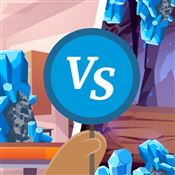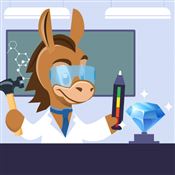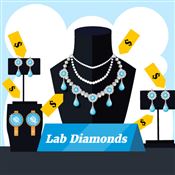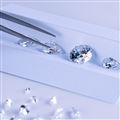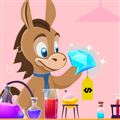Are Lab Diamonds Real
If lab diamonds are man-made, are they real? Or are you getting ripped off with a fake diamond? Here's what you need to know.
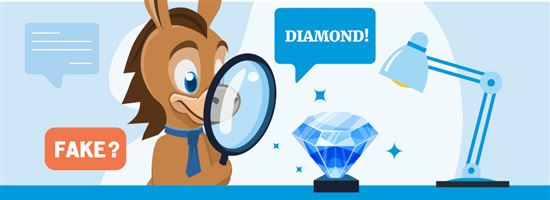 |
- Are Lab Diamonds Fake?
- What's the Difference Between Lab Diamonds and Natural Diamonds?
- Can You Tell the Difference Between Lab-Created Diamonds and Natural Diamonds?
- Do Lab-Created Diamonds Test as Real?
- Lab Diamonds vs Natural Diamonds
- Sustainability
- Certification
- Are Lab Diamonds the Same as Simulated Diamonds?
- Lab Diamond vs Cubic Zirconia vs Moissanite
- Why You May or May Not Want to Buy Lab Diamonds
No one wants to get ripped off with a fake diamond.
Like most buyers, you're probably ready to spend thousands on your ring. So it's only natural that you're worried about the stone's authenticity.
That's especially true for lab diamonds. Not only are they man-made, but they're also so much cheaper than their mined counterparts. With such a huge gulf in price, surely a lab diamond must be fake, right?
Not at all.
Are Lab Diamonds Fake?
The good news is, lab diamonds are just as real as mined diamonds. They're the exact same stones, except that one's grown inside a laboratory. You won't find any difference in their properties since they're both made of pure carbon.
So when someone asks you if your lab diamond is real, you can confidently answer yes.
What's the Difference Between Lab Diamonds and Natural Diamonds?
As their names hint, the only difference between lab and mined diamonds is in where they're made.
It takes billions of years to grow a natural diamond beneath the earth. This process is mimicked inside laboratories, but it's sped up to make diamonds in just weeks.
Lab diamonds are made either through the HPHT or CVD process. In HPHT, carbon forms into a diamond by exposing it to high pressure and high temperature. CVD works by heating a carbon-containing gas mixture until it solidifies into diamond crystals.
Can You Tell the Difference Between Lab-Created Diamonds and Natural Diamonds?
You can't tell lab from natural diamonds with naked eyes. Even expert jewelers with their loupes and microscopes can't. Unless you tell somebody, no one will notice your stone is lab-created.
The only way jewelers can tell is if the diamond has a laser inscription. Many lab diamonds are laser-inscribed with their report number and the words "Lab Grown." A jeweler should easily see this using a loupe.
Do Lab-Created Diamonds Test as Real?
Yes, most lab diamonds pass a diamond tester. Remember how they have the same properties as mined diamonds? These include electrical and thermal conductivity, which diamond testers use to detect diamonds.
However, there are instances when a lab diamond tests as moissanite. It can happen if the stone contains trace amounts of boron. This makes the stone electrically conductive like moissanite.[1]
But note that even natural diamonds can contain this element. So this doesn't mean that lab diamonds are inferior.
Lab Diamonds vs Natural Diamonds
There is no physical difference between natural and lab diamonds.
But you should be aware of gaps in price, value, and more before you say yes to the stone.
Price
On average, lab diamonds cost up to 75% less than their mined counterparts. And with their prices falling, they're likely to get even cheaper in the next years. But this may not be true for mined diamonds, whose prices have been soaring recently.
Lab diamonds sell cheaper thanks to mass production and a shorter supply chain. It's cheaper to make diamonds in a lab than to mine them. There are also fewer hands exchanging the stone, resulting in fewer markups for the customer to pay.
The price difference also gets higher for bigger carat sizes. Unlike mined, lab diamond prices do not skyrocket as carat size increases. So going lab-grown is a good option if you want a bigger stone within your budget.
See this for yourself in this table comparing lab diamond vs natural diamond prices. These are real examples from James Allen since they offer competitive pricing.
| Mined Diamond | Lab Diamond | Percent Difference | |
|---|---|---|---|
| 0.70 carat | $2,080 | $880 | 58% |
| 1 carat | $5,440 | $1,890 | 66% |
| 1.5 carat | $10,700 | $2,450 | 78% |
| 2 carat | $18,130 | $4,000 | 78% |
| 3 carat | $40,970 | $7,910 | 81% |
| 4 carat | $108,880 | $18,220 | 84% |
| 5 carat | $191,000 | $28,130 | 85% |
*Prices are current as of August 2, 2022. We've included the cheapest in-stock price for each diamond type. As a benchmark, all diamonds are G-H color, VS2 clarity, and Ideal cut. These are specs that will give you the best value.
Durability
Worried your lab diamond won't last forever?
Because they have the same properties, lab diamonds are just as durable as their natural counterparts. Both rank 10 on the Mohs hardness scale,[2] making them the hardest gemstones you can find. So you don't have to worry about your lab diamond getting cloudy or scratched.
This doesn't mean you can be reckless with your stone. Like mined diamonds, they can still chip if hit hard enough. You still need to put in some TLC to make your lab diamond last forever.
Resale Value
The main downside of lab diamonds is their very low resale value. Some jewelers warn that no one will buy a lab diamond back. Others claim you can still get 10%-20% of what you paid. That's super-low compared to the maybe 50% you can get back for mined diamonds.
If you think higher resale value means higher savings, hold up. Reselling a very expensive mined diamond doesn't always mean more savings.
Imagine reselling a 1-carat diamond using the prices listed on our table. Reselling for 50%, you lose $2,720 for the mined stone. Meanwhile, at 10% resale, you get only $189 for your lab diamond. But that's only $1,701 lost.
However, let's make this clear: no diamond is a good investment. Whether lab-grown or mined, diamonds have poor resale value. It just gets worse for lab diamonds.
Sustainability
Lab diamonds skirt many issues surrounding the mined diamond industry. You don't need to displace acres of land to make them. You also dodge the problem of blood diamonds, child labor and slavery rampant in diamond mines.
But this report from Trucost found that lab diamonds are not free from issues, either.
It still takes massive amounts of greenhouse gases to make lab diamonds. That's why the question of sustainability isn't as simple as it seems.
Certification
 |
Like mined diamonds, you can send lab diamonds to reputable laboratories for grading. Both are assessed using the 4C's: cut, color, clarity, and carat.
Most mined diamonds are certified by GIA and AGS. They're very reliable labs, but their services can be expensive. That's why lab diamonds are often sent to IGI or GCAL instead, which are seen as having more lax standards.
Are Lab Diamonds the Same as Simulated Diamonds?
No, and you should not confuse them. While lab diamonds are real, simulated diamonds are pretty much fake diamonds. Simulants can look just as white and sparkly, but they don't have the properties of real diamonds.
Diamond simulants are so good at mimicking the real thing that most people won't notice them. But jewelers can easily spot them.
They're also very cheap. So it's important to know what simulated diamonds are to avoid getting ripped off.
It depends on who you ask. When people hear synthetic, they usually think it's fake. That's why the FTC and GIA advise against the term "synthetic diamonds."
But some will still call lab diamonds "synthetic" because they're man-made. You'll hear this often from mined diamond companies that want to highlight the natural origin of their stones.
Lab Diamond vs Cubic Zirconia vs Moissanite
You're probably wondering how lab diamonds differ from simulants. Here's how they compare:
- Moissanite is another super-durable stone that won't get scratched or cloudy. This man-made stone can also last forever, but for a fraction of a diamond's price. You get a very flashy ring with moissanite since it emits intense rainbow sparkles.
- Cubic zirconia is also man-made. But it can chip and get cloudy after years. It's also very cheap, so it's sometimes treated as disposable. While it reflects rainbow sparkles, it's not as brilliant as a diamond.
Why You May or May Not Want to Buy Lab Diamonds
Still not sure if you should get lab diamonds? Here are some pros and cons to help you decide.
Pros
- Real but cheaper. For thousands of dollars less, you get a stone that's just as real, durable, and sparkly as a mined diamond.
- Eco and socially conscious. There's no destructive mining or concerns about labor safety and poor working conditions.
- Less likely to have visible flaws. It's easier to ensure the quality of lab diamonds since they're made in controlled setups.
- Cheaper fancy-colored stones. Because they're super-rare, prices for fancy-colored lab diamonds can be staggering. But technology makes it possible to make fancy-colored lab diamonds at a more affordable price.
- Cheaper to insure. You'll pay less to insure a lab diamond since they're cheaper to replace.
Cons
- No rarity or sentimental value. Some think lab diamonds aren't special since they're mass-produced. Your loved one may be one of them, so be sure to talk to them about this.
- Low resale value. If worse comes to worst and you need to resell your lab diamond, prepare to get way less than what you paid for.
- Fewer insurance providers. Policies may be cheaper. But insurance companies that cover lab diamonds may be harder to come by.
Bottom Line
Lab diamonds are just as real as mined diamonds.
You get a stone that's equally durable and sparkly. But you pay thousands of dollars less.
This doesn't mean lab diamonds are for everyone. Before committing to it, do your research first to see if it suits your preference. More importantly, talk to your loved one about this so you don't end up saying yes to the wrong stone.
References
- ^ ScienceDirect. Electrical conductivity enhancement by boron-doping in diamond using first principle calculations, Retrieved 8/28/2022
- ^ National Park Service. Mohs Hardness Scale, Retrieved 8/28/2022
Write to Chesca Santiago at feedback@creditdonkey.com. Follow us on Twitter and Facebook for our latest posts.
Note: This website is made possible through financial relationships with some of the products and services mentioned on this site. We may receive compensation if you shop through links in our content. You do not have to use our links, but you help support CreditDonkey if you do.
|
|
|
